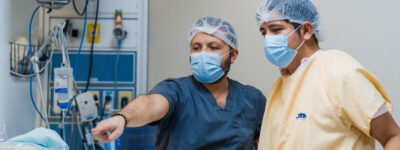What Are The Chances Of Getting COVID Twice? Here’s What We Know About A COVID-19 Reinfection
Coronavirus Reinfections Increase In Mexico
As the coronavirus pandemic continues, new variants are detected. The immunity gained from infections and vaccines begins to decline, and it is common to hear or know of someone who has become reinfected with COVID-19. Currently, most of the Mexican population has become infected with at least one of the COVID variants, and some people have gotten COVID more than once. Reinfections are becoming more frequent, and it is a pattern that may continue.
Approximately 6 million Mexicans have been infected with COVID-19, from the start of the pandemic to the date of this article.
Experts from the Centers for Disease Control and Prevention (CDC) assure that the increase in reinfections is due to a reduction in immunity acquired by previous infections and/or vaccinations. Likewise, the institution classifies reinfection as testing positive for COVID-19 more than 90 days after the last infection. Likewise, the Ministry of Health (SSA) affirms that the reinfection rate in Mexico has multiplied since the arrival of the Omicron variant. In addition, it states that around 20% of all infections reported in the country are due to COVID-19 reinfections.
The Omicron Variant, The Culprit For The Current Increase In COVID-19 Reinfections
The risk of reinfection by COVID-19 increased substantially after the discovery of the Omicron variant. Due to mutations in its shape, this new viral variant is less recognizable to our immune system, which means that the virus bypasses previously acquired immunity. Likewise, specialists assure us that another reason for getting COVID twice is that our immunity has decreased since the last time we were infected or vaccinated against the Coronavirus. For this reason, it is important to stay up to date on your vaccination and booster appointments.
How Does A COVID-19 Reinfection Occur?
When someone becomes infected with the Coronavirus, their immune system responds with antibodies that will help fight the virus if exposed again. Still, it is not clear how long this immune response lasts, or whether the percentage of antibodies created to defeat the disease is too few or disappears too quickly. In addition, according to the CDC, certain people are more likely to suffer from COVID reinfection:
- People who suffered from severe symptoms during the first infection.
- Those who were hospitalized or needed intensive care.
- People with underlying health problems or conditions.
- Individuals who have not been vaccinated.
Differences Between A COVID-19 Reinfection And Post-COVID-19 Conditions
Most people affected by COVID-19 fully recover within a few days. However, some people may feel unwell for several weeks or months after the infection. This is known as Long COVID or Post COVID Conditions. But how can we distinguish if a person is suffering from long COVID or COVID reinfection?
CDC specialists assure that if the COVID symptoms never completely disappeared, it is likely that they are symptoms of long/post COVID. However, if the person had shown complete improvement, and after some time they experience symptoms again, it is COVID-19 reinfection. Therefore, if you have any suspicions, it is important to visit your doctor immediately.
What Are the Long COVID or Post COVID Symptoms?
Some of the most common symptoms that people experience are:
- Respiratory problems
- Headaches and migraines
- Insomnia
- Memory or concentration problems
- Loss of smell and/or taste
- Depression or anxiety
- Dizziness
- Chest pain
- Digestive problems, such as diarrhea and stomach pain
Becoming Reinfected by COVID Can Cause Long-Term Health Consequences
According to the Mayo Clinic, COVID-19 affects not only the lungs, but also the heart, kidneys, and brain. This increases the risk of long-term health problems. Therefore, suffering from long-term symptoms of COVID-19 or reinfection can cause health complications that will remain after the disease.
In some people, especially older adults and people with serious medical conditions, lingering health effects can include:
- Respiratory problems
- Cardiac complications
- Chronic renal impairment
- Stroke
- Guillain-Barré Syndrome, a condition that causes a temporary paralysis
Nonetheless, more information is needed on how COVID-19 may affect people’s long-term health. Experts still recommend that people continue to wear masks, practice social distancing, avoid closed spaces, and get vaccinated as soon as possible.
How To Protect Yourself From A COVID-19 Reinfection?
Getting COVID-19 is possible even if you are fully vaccinated. Therefore, to protect yourself from reinfection, our experts recommend the following:
- Get vaccinated against COVID-19
- Receive the booster shot
- Use face masks correctly
- Maintain social distancing
- Avoid crowds
- Wash your hands frequently
- Open up closed spaces
COVID-19 Reinfection Frequently Asked Questions
Reinfections by COVID-19 are becoming more frequent. However, this varies between individuals, and also among the COVID-19 strain that is the most active in the world. For this reason, it is difficult to determine how often a person can become reinfected. The COVID-19 virus will continue to evolve, and most likely, there will be people who will experience multiple reinfections throughout their lives.
Lowering the prevention and safety measures, as well as Omicron mutations, are two of the factors that have contributed to the current increase in reinfections by COVID-19. In addition, the vast majority of people have lost their immunity acquired from previous infections and/or from Coronavirus vaccines, which has played a role in the rise of new COVID cases.
Getting vaccinated against COVID-19 helps prevent serious infection and re-infection. Therefore, the experts state that it is a good preventative measure, even if you already had COVID. However, the immunity offered by vaccinations starts to diminish after a few months, so getting a booster is recommended.
The severity of the reinfection symptoms is not fully determined, as there is no direct link between the severity of the first infection and the second. In addition, the symptoms will depend on the type of variant acquired. However, specialists assure that reinfections in vaccinated people are generally less serious.
If you think you are infected or reinfected with COVID-19, visit your nearest CMQ Hospital. Our doctors are ready to help you.




